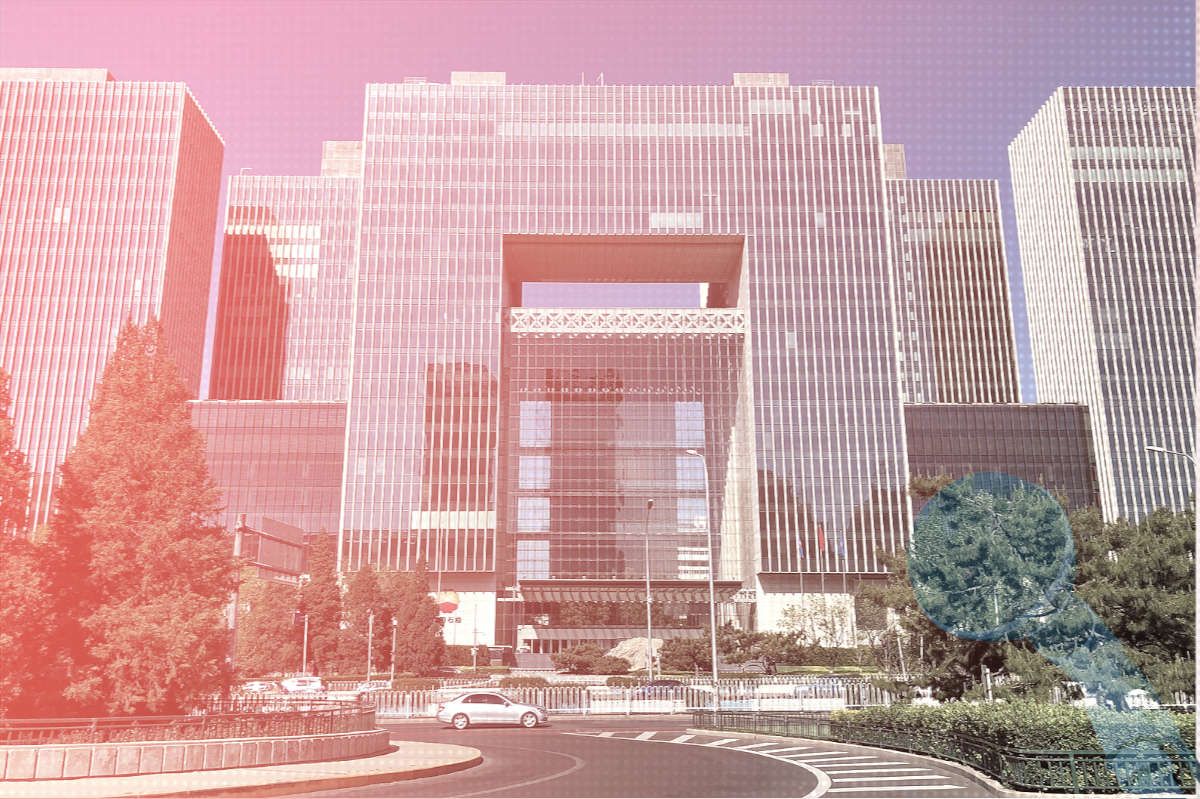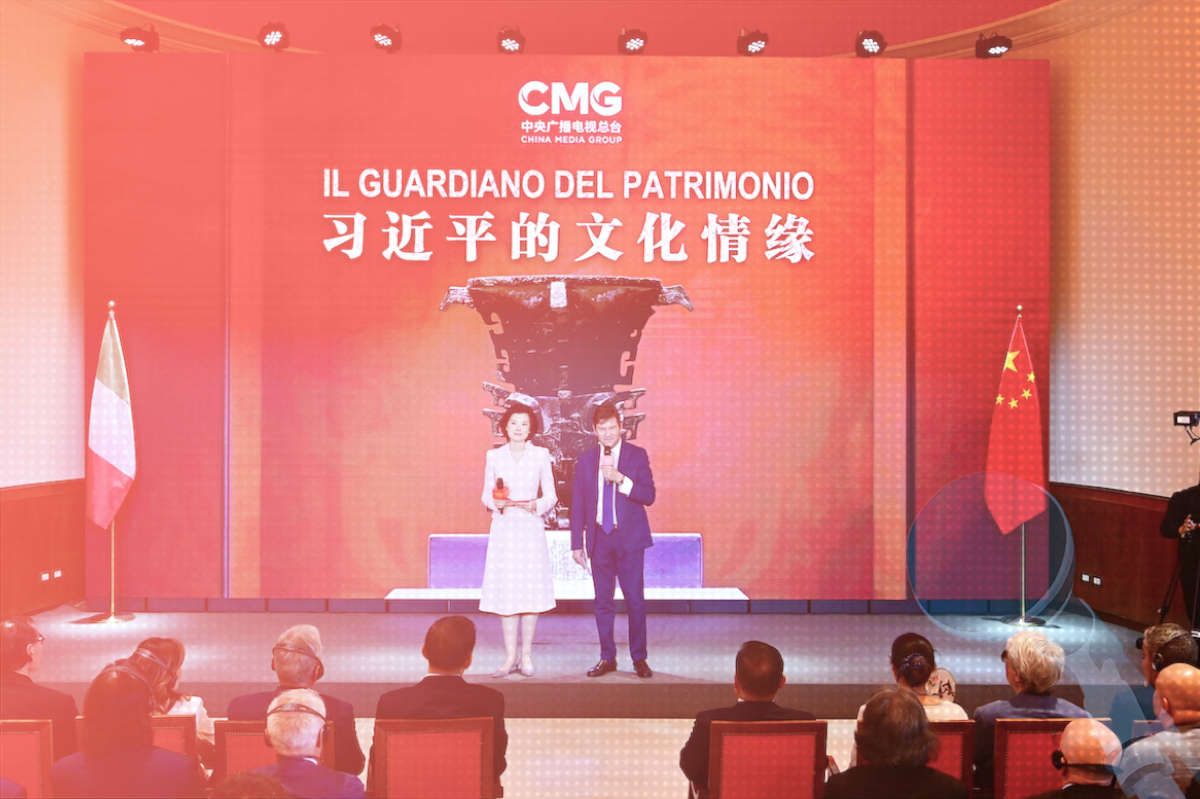China Newspeak
False Reassurances
Though hardly a surprise, news today that the Standing Committee of China’s National People’s Congress has passed a sweeping national security law for Hong Kong, the exact text of which has still not been made public, has rattled nerves. Anticipating the law, the Hong Kong government has in recent days sought to reassure businesses and the Hong Kong people that the city’s fundamental values, including judicial independence, will remain untouched by the new measures.
These reassurances have been mirrored in Chinese state media, which have insisted Beijing remains committed to the “one country, two systems” principle for Hong Kong. A reader visiting the official People’s Daily Online last week, for example, would have seen, just below a prominent advertisement on the “important speeches” of Xi Jinping, a bold headline that read: “National Security Law Will Not Influence Hong Kong’s Judicial Independence.”

But here, in a headline intended to console, we have one of the most compelling reasons to question Beijing’s sincerity over one of Hong Kong’s most cherished values. In fact, this term, “judicial independence,” or sifa duli, has been regarded by the Chinese Communist Party in recent years as highly sensitive, a mark of the same supposedly destabilizing elements, including alleged foreign interference, that it has cited as its rationale for pushing through a national security law.
The CCP is here in the odd position of reassuring the Hong Kong people over values it has openly professed to despise as “Western” and “erroneous.” In fact, more careful readers of China’s party-state media might have been surprised – as I was – to see “judicial independence” displayed so prominently in a headline at all.
We cannot forget that “judicial independence” was among a number of extremely sensitive concepts mentioned in so-called the “Document 9” released in 2013, an internal communiqué referred to also by the shorthand “seven don’t speaks” (七不讲). The document outlined seven “perils” that included constitutionalism, and “judicial independence” was included under the constitutional umbrella as an “attempt to undermine the current leadership and the socialism with Chinese characteristics system of governance.”
More than five years ago, I wrote a piece here at CMP called “Who Gave ‘Judicial Independence’ the Death Sentence,” chronicling the long acceptance of “judicial independence” within CCP discourse through the Deng Xiaoping era and into the second term of Hu Jintao. After 2008, things grew uneasy, even though more optimistic voices – including Caixin Media’s Hu Shuli – held out the hope that the 18th National Congress of the CCP in late 2012, during which Xi came to power, might be a positive turning point for both “judicial independence” and “political reform.”
Such hopes were dashed against the hard facts of Xi’s emerging “new era,” which from the summer of 2015 brought a sustained crackdown on rights lawyers. In January 2015, just months ahead of that crackdown, Politburo member Zhang Chunxian (张春贤) sent another signal by tightening the screws of “socialist rule of law with Chinese characteristics”:
Our nation’s rule of law is different from the West’s so-called “constitutionalism,” and the crux of this is the organic unity of adherence to the leadership of the Party . . . . Our rule of law is not the rule of law of the “separation of powers,” and we cannot take the road of the West’s “judicial independence” or “judicial neutrality.” On this question we cannot be vague. We must be confident and resolute.
It would be foolish, given Xi’s continued consolidation of power and the emphasis on CCP control of all aspects of Chinese life, to suppose that the leadership has grown less resolute on the question of “judicial independence” – to the point that it can acceptably appear in a major headline. So how does one explain this recent billboard appearance at People’s Daily Online, the re-emergence of a term on which the Party soured years ago?
In fact, a closer look at the contexts in which “judicial independence” has been used in the official CCP discourse over the past few years reveals a great deal about how the Party seesaws in its portrayal of the concept in order to suit its domestic and international agendas. In order to investigate further, I took the most recent 10+ articles in the People’s Daily newspaper using the term “judicial independence.”
All of the most recent six articles in the newspaper, published since December 12, 2019, deal with the question of Hong Kong, all affirming the independence of the territory’s judiciary and denying those who insist that the policy of “one country, two systems” is under threat. The most recent, published yesterday, June 25, argues that the pending national security law “is a strong support for the judicial system of Hong Kong, and a tangible guarantee for the legal rights of the majority of Hong Kong citizens. It does not harm and will not harm judicial independence in Hong Kong.”
All of these six articles are meant to be reassurance signals, and nearly all include the phrase, “will not impact the judicial independence of the Hong Kong SAR” (不会影响香港特区的司法独立). So in these cases, the use of “judicial independence” is externally referential, in the sense that it applies outside of mainland China, and deals with a matter also that is broadly of international concern.
As soon as the context become domestic politics and law, however, the gap is precipitous. The seventh article in the People’s Daily, published on March 20, 2019, is an address given by Guo Shengkun (郭声琨), secretary of the CCP’s Central Political and Legal Affairs Commission, to a conference of the China Law Society held the previous day. Guo first signals loyalty to Xi Jinping with a reference to the “442 formula,” then proceeds to emphasize the party’s leadership over the law:
It is hoped that the vast majority of legal workers will adhere to the guidance of Xi Jinping Thought on Socialism With Chinese Characteristics for the New Era and consciously be practitioners of socialist rule of law with Chinese characteristics. It is necessary to enhance the “four consciousnesses,” strengthen the “four self-confidences,” and achieve the “two protections” to ensure the correct political direction of the law and legal work. We must deeply understand that the leadership of the Chinese Communist Party is the fundamental guarantee and the greatest advantage of socialist rule of law with Chinese characteristics. We must unswervingly and in a comprehensive manner adhere to the party’s leadership over the rule of law. It is necessary to consciously insist on proceeding from the national conditions and reality of China, taking the road of socialist rule of law with Chinese characteristics, and resolutely resisting the erroneous ideological trends of Western ‘constitutionalism,’ “separation of powers,’ and ‘judicial independence.’“
The eighth article in the “judicial independence,” published on September 19, 2018, returns to the context of international affairs. This time, the article deals with “rifts” between Eastern and Western Europe, specifically over the question of Poland and the decision by the European Network of Councils for the Judiciary (ENCJ) to deprive the Polish National Judicial Council of its voting rights in the network. The article reads at the start: “Lately, the conflict has escalated between the European Union and Poland and Hungary. On September 17, the ENCJ announced the cancellation of Poland’s voting rights on the grounds that judicial reforms in Poland undermined judicial independence, and it said it would suspend the membership of the Polish National Judicial Council.”
In this case, the mention of “judicial independence” has no bearing on China’s internal politics. Moreover, the Poland case can serve to emphasize – and this is clear from the headline – divisions within Europe, which broadly serves China’s interests in engaging with the region.
What happen when the seesaw swings back to domestic politics? The ninth article in the People’s Daily, published on September 7, 2018, deals with China’s “progress” on rule of law since the 18th National Congress of the CCP. The article says that China “must be unswerving” in taking the path of “socialist rule of law with Chinese characteristics,” and immediately after hammers home the familiar refrain:
General Secretary Xi Jinping has pointed out: “The foundation of our governance is the leadership of the Chinese Communist Party and the socialist system.” By defining this fundamental issue, we can effectively resist “Western constitutional government,” “separation of powers,” “judicial independence,” “multi-party politics” and other erroneous trends of thought ensure that comprehensively governing the country according to law will always follow the correct orientation.
In this case again the CCP’s outright rejection of “judicial independence” could hardly be clearer. It is an “erroneous trend of thought,” and by default an “incorrect” political orientation. Given the determination and secrecy with which the leadership is pushing national security legislation in Hong Kong, this has to raise questions, admittedly obvious ones, about whether China is serious at all about this commitment to “judicial independence” on Chinese soil.
The fact is that lip service to “judicial independence” serves China’s interests when this concerns international matters – and Hong Kong, though a Chinese territory, does belong in this category given the fact of “one country, two systems,” and the importance of the SAR as an international financial hub, and a reflection of China’s international treaty commitments, and so on.
Lip service is again given to “judicial independence” in the tenth People’s Daily article, an interview with Xue Hanqin (薛捍勤), a Chinese jurist at the International Court of Justice. Given the article’s focus on international matters, we can expect a neutral treatment of “judicial independence,” and that is exactly what we get:
The International Court of Justice is located in The Hague, the Netherlands, and is one of the six major UN agencies. Xue Hanqin told reporters that as the most important judicial organ of the United Nations, the International Court of Justice is the only major UN agency that has not established its office the New York headquarters [of the UN] because of its historical origins and also to ensure judicial independence and freedom from interference.
There is nothing threatening at all about “judicial independence” in this context, which even seems to suggest that the threat to this independence is in fact meddling from the United States, which places the concept more squarely within China’s long-standing opposition to “foreign interference” in international affairs.
Which brings us to the eleventh article on the People’s Daily list, which deals in August 2018 with a diplomatic spat between Saudi Arabia and Canada that began after Canada’s Foreign Affairs Minister Chrystia Freeland tweeted her concerns about the arrest of several activists in Saudi Arabia.
Here is how the People’s Daily reported Saudi Arabia’s response over the issue of human rights: “According to an August 9 report by the mainstream Saudi newspaper Okaz, Saudi Justice Minister Sheikh Walid criticized Canada’s criticism of Saudi Arabia’s internal affairs and justice, and emphasized that Saudi Arabia rejects any interference in Saudi Arabia’s internal affairs and judicial independence.” Here we have a statist view of “judicial independence,” which holds, quite in line with China’s foreign policy views, that the primary measure of “independence” is the degree to which national sovereignty in justice cases is respected.
With number twelve on our People’s Daily list, we return to domestic politics, with a report outlining the “legal work of the State Council” in 2017. The article appears in the January 19, 2018, edition of the newspaper. If our assumptions about the domestic/international dynamic in the use of “judicial independence” hold true, we should expect to see a fulsome attack on the concept. And we are not disappointed. On how to implement “socialist rule of law with Chinese characteristics,” we are told:
The first [principle] is to strengthen the research on the theory and practice of socialist rule of law with Chinese characteristics, and organize forces to actively speak through such central media as the People’s Daily, Seeking Truth and CCTV, publicizing the achievements of comprehensively governing the country by law, and refuting “Western constitutionalism,” “separation of powers,” “judicial independence,” “multi-party politics” and other such trends in “political Westernization.”
This clearly professed antipathy toward “judicial independence” in the context of domestic political concerns should prompt extreme skepticism as China seeks to reassure Hong Kong over the question of autonomy.
Alleged collusion with “foreign forces” jeopardizing national security, and “foreign interference in Hong Kong affairs,” have been repeatedly cited by party-state media as a key rationale for the national security law. But despite reassurances over Hong Kong autonomy and the territory’s core values, the CCP has itself defined “judicial independence” as fundamentally alien and “Western” in nature, as a road that must not be taken, and as a tool of “political Westernization.”
[Featured image of Hong Kong skyline by Azwari Nugraha, available at Flickr.com under Creative Commons license.]





















